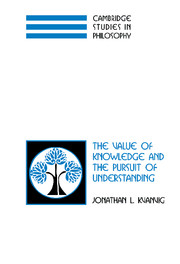Book contents
- Frontmatter
- Contents
- Introduction
- 1 The Value of Knowledge Is External to It
- 2 The Value of True Belief
- 3 The Value of Justification
- 4 Reliabilism, Normativity, and the Special Promise of Virtue Epistemology
- 5 The Gettier Problem and the Value of Knowledge
- 6 Knowledge as Irreducibly Valuable
- 7 Epistemic Attitudinalism: Semantic and Pragmatic Approaches
- 8 Knowledge and Understanding
- 9 Conclusion
- References
- Index
4 - Reliabilism, Normativity, and the Special Promise of Virtue Epistemology
Published online by Cambridge University Press: 14 August 2009
- Frontmatter
- Contents
- Introduction
- 1 The Value of Knowledge Is External to It
- 2 The Value of True Belief
- 3 The Value of Justification
- 4 Reliabilism, Normativity, and the Special Promise of Virtue Epistemology
- 5 The Gettier Problem and the Value of Knowledge
- 6 Knowledge as Irreducibly Valuable
- 7 Epistemic Attitudinalism: Semantic and Pragmatic Approaches
- 8 Knowledge and Understanding
- 9 Conclusion
- References
- Index
Summary
The motivation for the present chapter arises from the swamping problem regarding the property of objective likelihood of truth. This property is one that it is better for a belief to have than to lack, but it is also a property that adds no value to true belief itself. That is, a belief that is both true and objectively likely to be true is no more valuable than a belief that is merely true. The value of objective likelihood of truth is wholly parasitic on the value of truth itself, so once truth is in the picture, objective likelihood of truth can add no further value. In the same way, Swinburne and others claim, reliabilism cites a property of belief that it is better to have than to lack, but that is also one that adds no value to true belief itself.
Reliabilists can attempt to evade this argument by citing the normativity of knowledge. Perhaps reliability is precisely that natural property on which the normativity of knowledge supervenes. If so, reliabilists can lay claim to a theory immune to the swamping problem because the value derived from reliability is just that value involved in the normativity of knowledge. The easiest way to see the idea here is to take reliabilism to be offering a theory of justification, though this assumption is not crucial.
- Type
- Chapter
- Information
- The Value of Knowledge and the Pursuit of Understanding , pp. 76 - 107Publisher: Cambridge University PressPrint publication year: 2003



